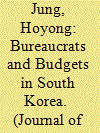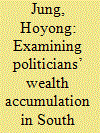|
|
|
Sort Order |
|
|
|
Items / Page
|
|
|
|
|
|
|
| Srl | Item |
| 1 |
ID:
191964


|
|
|
|
|
| Summary/Abstract |
This article presents evidence that high-ranking public officials in the Ministry of Strategy and Finance in South Korea affect local budget allocation. Applying a regression model on a uniquely constructed panel dataset, I found that the growth rate of the per-capita National Subsidy, which is a subcomponent of the national budget susceptible to discretionary behaviors, increases approximately 7 percent in the hometowns of high-ranking bureaucrats. To validate these findings and address causality, I conducted a battery of auxiliary robustness checks, which yielded confirmatory results. This study also found that enhancing transparency in the budget allocation system can alleviate concerns about bureaucratic hometown favoritism, providing suggestive evidence of bureaucrats’ rent-seeking behaviors without government transparency.
|
|
|
|
|
|
|
|
|
|
|
|
|
|
|
|
| 2 |
ID:
172650


|
|
|
|
|
| Summary/Abstract |
One of the public’s popular beliefs about politics is that politicians engage in rent-seeking behaviors, such as accumulating property, using their political power. By applying a regression discontinuity design, this study examines whether members of the National Assembly of South Korea gained assets during three elective terms (2004–2008, 2008–2012, and 2012–2016). The results contradict the public’s claim. In general, there is minimal evidence that election winners accumulate more assets than runners-up. And observing the winners’ premium for newly elected politicians in the 2012–2016 term, I find that it is related to a political support fund, which is a legitimate channel for politicians’ funding. The results suggest that an information disclosure policy can play a pivotal role in restricting politicians’ rent-seeking behaviors.
|
|
|
|
|
|
|
|
|
|
|
|
|
|
|
|
| 3 |
ID:
176137


|
|
|
|
|
| Summary/Abstract |
In July 2018, the Korean National Pension Service (KNPS), one of the world’s largest pension funds, introduced a stewardship code, and in February 2019 it first exercised active shareholder engagement in an investee. Using an event study methodology, we examine whether this institutional investor’s active shareholder engagement affected the stock market. We find that the stock value of the KNPS’s investees was reduced after the active shareholder engagement. The effect was larger in the case of small-cap stocks, companies in which the KNPS has a 5–10% share, and firms with a lower environmental, social, and governance grade. This implies that market concerns about government intervention are valid, and institutional reforms are necessary, including specific guidelines to balance shareholder and management rights.
|
|
|
|
|
|
|
|
|
|
|
|
|
|
|
|
|
|
|
|
|